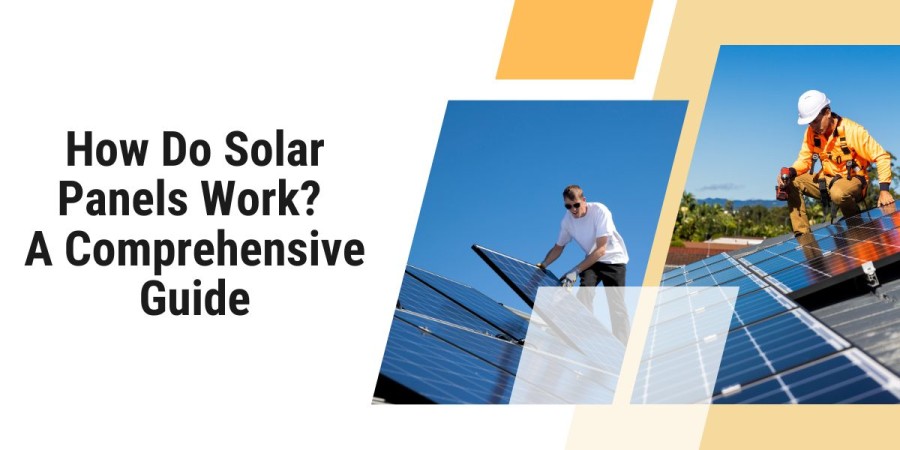We see them on rooftops, quietly soaking up the sun, but how exactly do solar panels work? If you’ve ever wondered how those sleek panels turn sunshine into electricity, you’re in the right place. This guide breaks down the process in simple, practical terms. Whether you’re curious or considering investing in a solar panels and battery package, we’ve got you covered.
What Are Solar Panels?
At their core, solar panels are devices designed to capture sunlight and convert it into usable electricity. They’re made up of smaller units called photovoltaic (PV) cells, usually crafted from silicon, a material that naturally generates an electric current when exposed to light. These panels are the heart of any solar energy system, and they work best when paired with other components like inverters and battery storage.
The Science Behind Solar Panels
Here’s where it gets interesting—solar panels rely on something called the photovoltaic effect. When sunlight hits the PV cells, it knocks electrons loose from their atoms. These free electrons flow through the cell, creating an electric current. This current is in direct current (DC) form, which then gets converted into alternating current (AC) via an inverter—making it compatible with household appliances.
Types of Solar Panels
Choosing the right type of panel can make a big difference in performance and aesthetics:
- Monocrystalline: Known for high efficiency and sleek design. These are often found in high-end systems.
- Polycrystalline: Slightly less efficient but more affordable. A solid choice for budget-conscious homeowners.
- Thin-Film: Lightweight and flexible, ideal for unconventional spaces but generally less efficient.
When bundled with a solar panels and battery package, your choice of panel impacts not just power generation but also long-term energy storage.
Components of a Solar Power System
A complete solar setup includes more than just panels:
- Inverter: Converts DC electricity into AC power.
- Battery Storage: Lets you store excess power for nighttime or cloudy days.
- Mounting Equipment: Secures panels to your roof or ground array.
- Monitoring System: Tracks your system’s performance in real-time.
If you’re unsure where to start, speaking with one of the best solar installers in your area can make this process feel less overwhelming.
Installation Process
Going solar doesn’t happen overnight, but it’s a well-oiled process:
- Site Assessment – A technician will evaluate your roof’s condition and sunlight exposure.
- System Design – Your solar provider creates a custom layout tailored to your home’s energy needs.
- Permits and Approvals – Local regulations and applications are handled.
- Installation – Mounting the panels and connecting everything.
- System Activation – Once approved, your system is turned on and ready to go.
Working with the best solar installers ensures smooth sailing from start to finish.
Benefits of Solar Energy
There are plenty of reasons why people are switching to solar:
- Lower Electricity Bills: Generate your own power and rely less on the grid.
- Energy Independence: Store your energy with a battery and be prepared for outages.
- Environmental Impact: Cut down on carbon emissions and reduce your footprint.
- Increased Property Value: Homes with solar systems often sell faster and at higher prices.
Common Myths and Misconceptions
Let’s clear the air on a few things:
- “Solar panels don’t work when it’s cloudy.” – False! They still generate electricity, just at reduced capacity.
- “They’re hard to maintain.” – Not really. Occasional cleaning and yearly checkups are usually all you need.
- “They’re too expensive.” – Prices have dropped significantly, and financing options make them more accessible than ever.
FAQs
How long do solar panels last?
Most panels come with a 25-year warranty and can last even longer.
Do solar panels work during a blackout?
Only if paired with a battery storage system.
Can I go off-grid with solar?
Yes, especially with a robust solar panels and battery package.
Will solar increase my home’s value?
In many cases, yes—especially with high-quality equipment like the best solar panels.
Are there government rebates?
Absolutely! Many local and federal incentives are available to reduce upfront costs.
Conclusion
Now that you know how solar panels work, you’re better equipped to make informed energy choices. From the photovoltaic effect to full system installations, the world of solar is full of smart solutions. If you’re ready to explore your options, consider reaching out to one of the best solar installers in your area and ask about a solar panels and battery package tailored to your needs.

